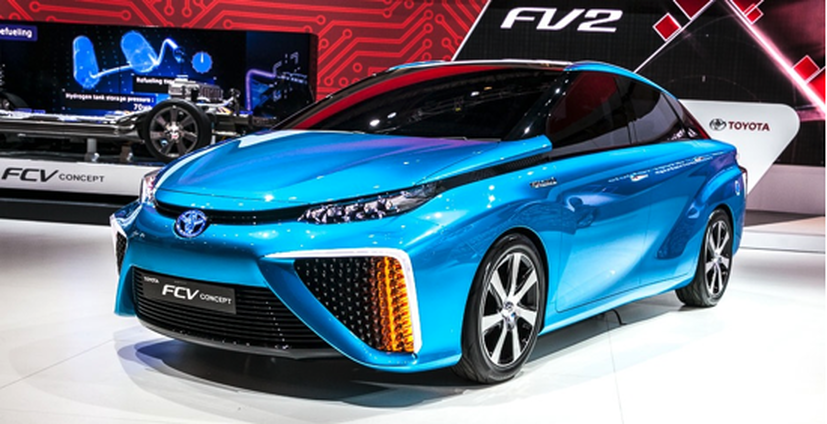Let us understand how fuel cell system works in order to understand the difference. Both electric vehicles and fuel cell vehicles are driven by electric power train. That means both cars use electric motor to drive the wheels. The difference is how electricity is stored and generated. Hydrogen fuel cell vehicle uses fuel cell to generate electricity from hydrogen whereas battery electric vehicles use the energy stored in batteries. The diagram below shows the working principle of fuel cell systems.
|
Of course the actual construction of fuel cell is much more complicated than this gif image can show but this will give a good idea about how the basic reaction takes place inside a hydrogen fuel cell. In common terms fuel cell is an electric generator that uses hydrogen as fuel and produces electricity as an output. Now this electricity can be used in transportation using electric drivetrain. The major auto manufacturers mentioned above are developing cars working on this principle.
When a hydrogen-rich fuel enters the fuel cell stack, it reacts electrochemically with oxygen (i.e. ambient air) to produce electric current, heat and water. |
 |
Hydrogen fuel cell cars can win this category. Fuel cell vehicle can have 300 mile range and can improve on that by storing more hydrogen on board. Storing hydrogen is a challenge but new tank design will allow higher pressures and larger quantity of gas to be stored on board. Electric vehicles can achieve 300 mile range but need high cost battery system to achieve that range. Only Tesla Model S with 85kWh battery can achieve that range under good driving conditions. Affordable electric vehicles like Nissan Leaf and Ford Focus EV can achieve only 75 to 80 mile range.
Fueling / Charging Time:
Hydrogen fuel cell vehicle fueling is similar to their gasoline counterparts. Centralized stations will be needed to dispense high pressure hydrogen. Fuel cell vehicle with 300 mile range will take approximately 3 to 5 minutes to fuel. Electric vehicles take longer time to charge as battery systems have limitation on charge acceptance. High power charging can be done but still it will take at least 30 minutes to charge the vehicle.
Cost:
Electric vehicles with limited range cost much lower than fuel cell vehicles. Toyota Fuel cell vehicle is expected to cost around $75,000 after government incentives. Now that is almost twice the price of $30,000 Nissan Leaf. Studies have shown that average driver in the United States drives less than 40 miles per day. Paying that premium to achieve 300 mile driving range is a difficult proposition. Electric vehicles will win this category of cost effectiveness.
Cycle life:
Batteries have limited cycle life. Batteries start to degrade as you perform charge discharge cycles. After approximately 2000 cycles the power delivery capacity of batteries degrades a lot and you will need to replace the batteries to operate the vehicle. Hydrogen fuel cell vehicles do not have this problem. The membrane used in fuel cell system also needs replacement but it will easily last longer than batteries.
Infrastructure:
This is the biggest challenge for both technologies but electric vehicles are in a better position than hydrogen fuel cell vehicles. Hydrogen fuel cell vehicles require dedicated high pressure hydrogen fueling stations. Electric vehicles with on-board chargers can charge anywhere using grid or solar power. Installing electric vehicle charging stations is much simpler and most of the drivers can just charge the vehicles at home.
Energy Intensity:
This is where I think electric vehicles will win the race. Currently there are only two ways to generate hydrogen, electrolysis or using methane reformer. Methane reformer uses natural gas as a base material to generate hydrogen, so hydrogen produced will not be completely pollution free or carbon neutral. If we use electrolysis to generate hydrogen, then you will need to spend more electricity to generate hydrogen than what you will get back.
If we evaluate above six factors, it is very clear that hydrogen fuel cell vehicles have important advantages such as range, fueling time and equipment life but have disadvantages of cost, infrastructure and energy intensity.
The driving distance per day of an average American is far lesser (~40 miles) than what electric vehicles provide (It is even lower in India and Europe), electric vehicle charging can be easily integrated in the grid or with solar panels and the cost of electric vehicles is lesser than that of fuel cell vehicles. Overall electric vehicles provide great value over hydrogen fuel cell vehicles. Toyota, Hyundai, Honda and Volkswagen are betting big on fuel cell vehicles and Nissan, BMW and Tesla are advancing battery electric vehicles. The race between these technologies to provide zero emission transportation will be interesting. I personally believe electric vehicles will provide great value to the customer and will be difficult to compete against. Integration with existing infrastructure and continuous advancement in battery energy density will ultimately provide the best value to the consumer.

